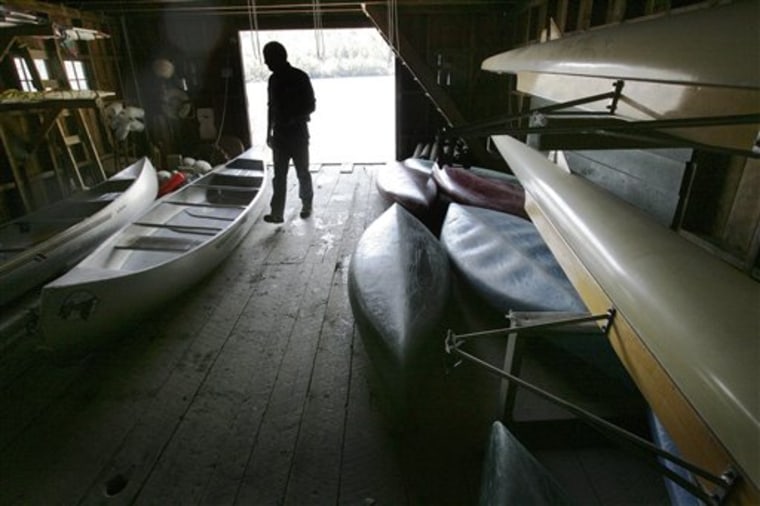As headlines about a struggling economy pour in, parents worried about their wallets are waiting longer to register their children for summer camp and more are asking for financial aid.
Day camp directors said parents are making decisions a month or two later than usual as they determine their summer finances, said Peter Surgenor, the national president of the American Camp Association.
Similarly, YMCA resident and day camps started to see a slowdown in registrations in March "when economic news stories became more certain of recession in mid March," said YMCA camping specialist Gary Forster.
Historically during past recessions and real estate downturns, as many as 25 percent of parents waited longer than usual to sign up for YMCA camp, Forster said, and the average length of a camper's stay declined. The waiting lists for camps shortened, too, but camp attendance stayed steady.
ACA's Surgenor is confident, however, that summer camp will remain a top priority for parents despite the economic outlook.
"I think that summer camp is one of the last cuts they make in their budgets because it's a key component to their children's summer experience," Surgenor said. "When the economy gets a little tight, camp becomes an attractive alternative and sometimes purchased at the expense of a family vacation."
Parents are struggling with an economy on the brink of recession: food and fuel costs are rising, housing values are dropping and access to credit remains limited. Retail spending, which makes up two-thirds of economic activity, has mostly stalled this year and consumer confidence has plummeted to its lowest reading in 26 years.
To save and invest more, Peter and Maria Stokstad of Missoula, Mont., are cutting back on summer camps for their three children this year. The first camps they're looking to cut: the ones that require a hefty drive.
The couple is waffling over a piano camp for their oldest daughter, 12-year-old Anastacia. The camp is in Salt Lake City, a 525-mile drive for Maria who is "shocked" every time she fills up her van's tank.
"We haven't figured out everything for sure. There's no way can do the gas and a hotel. So unless I can stay with a friend, we can't do it," she said.
The average national price of a gallon of regular gas jumped Monday to $3.603 a gallon, a record high, according to a survey of stations by AAA and the Oil Price Information Service.
Some camp directors are hoping parents will use their economic stimulus checks — set to hit mailboxes and bank accounts starting this week — toward camp tuition. The checks are part of an $168 billion economic stimulus plan passed by Congress. Under the plan, families who have filed their tax returns for the year can get up to $1,200, plus $300 per child.
The Flat Rock River YMCA Camp in St. Paul, Ind., recently sent postcards out encouraging parents to use part of their checks for camp. So far, they appear to have worked; registrations are up 4 percent from this time last year.
"I think registrations are coming in because parents won't skimp on their kids at first," said Flat Rock director Steve Heiny. "Parents may cut a trip to Six Flags or Disney World, but not summer camp. It's too important for their kids."
However, surging foreclosures are taking a toll on YMCA Camp Jones Gulch in La Honda, Calif. Financial aid applications are rising, Associate Executive Director Jennifer Clink said, and some programs are seeing a drop-off in registrations.
K. Robert Bengtson, the director of Camp Mowglis in Hebron, N.H., also is seeing more financial aid requests, some of them coming from parents who didn't need aid in the past.
Founded in 1903, the seven-week outdoors camp for boys ages 7 to 14 costs $5,450. On average, a quarter of the 85 campers receive some sort of financial assistance.
"If you're an average family, paying another $3,000 a year on gasoline and heating oil, then you don't have as much discretionary income," Bengtson said. "I would say that the majority of our families are middle income, and so I think they have been affected."
Not all camps are feeling the effects of the uncertain economy.
Jeff Cheley, the director of Cheley Camps in Colorado, said registration for his four-week overnight camp hasn't changed much from last year, mostly because a "big chunk" of the registrations came in last September after the previous summer's session. The camp, located near Rocky Mountain National Park, costs $4,100 for four weeks.
At Schaffer's High Sierra Camp in the Tahoe National Forest in California, registration has increased 31 percent over the same time last year. However, half of the registrations typically come in after May 1, camp director Scott Schaffer said. The camp charges $1,095 for one week with sessions between one and eight weeks.
However, the camp itself is scaling back its development plans, including new cabins, a bathhouse expansion and improvements to the camp infrastructure like the water system.
"We've been more conservative in our own projections. We were holding off on our own capital expenditures until we got a better picture of what the summer will look like," Schaffer said.
Back in Montana, the Stokstads are negotiating with their children about which camps get the heave-ho. They're eliminating an outdoors camp for their 10-year-old son Lucas and a drama camp for their youngest daughter Gabriella.
"It's $160 for a week, which seems like a lot for an eight-year-old," Stokstad said. "My oldest daughter understands and helped us choose which camps to cut. But my youngest daughter, she can't imagine not going to these camps."
